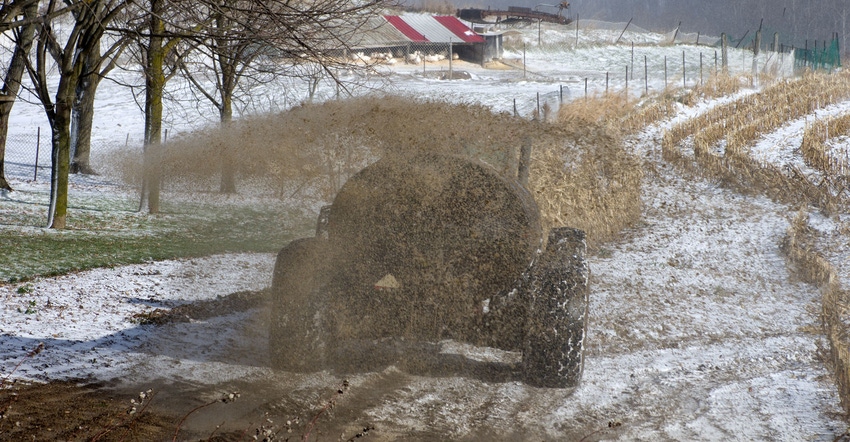
This is crunch time for many dairy farmers in the Mid-Atlantic and Northeast.
Several states including Maryland, Delaware and Vermont ban winter manure spreading. In states that don’t ban winter manure applications, including Pennsylvania, there are rules farmers have to follow if they need to spread manure in the middle of winter.
Here are the winter manure spreading guidelines for several states in the region:
Connecticut
No winter ban, though it is not recommended on frozen or snow-covered ground.
Delaware
The winter manure ban is in effect from Dec. 7 to Feb. 15. Application outside those dates is prohibited on frozen or snow-covered ground. More information can be found online.
Maine
Winter manure ban is in effect from Dec. 1 to March 15.
Maryland
Winter manure ban is in effect from Dec. 15 to March 1.
According to the Maryland Department of Agriculture, “Farmers may resume nutrient applications on March 1 as long as fields are not saturated, snow-covered or hard-frozen.
“The department is authorized to work with farmers to prevent overflows from storage structures in the winter and to minimize impacts to water quality. In these circumstances, farmers must contact the Nutrient Management Program for authorization before any spreading can take place.”
Temporary field stockpiling of stackable manure is allowed so long as the moisture content is 60% or less.
Farmers with questions should contact the Nutrient Management Program at 410-841-5959 or visit the program’s website.
Massachusetts
No winter manure ban, though there are limitations:
No spreading of solids on fields where slopes are greater than 7%.
No liquid spreading on fields where slopes are greater than 2%.
No spreading within 200 feet of surface waters.
At least 30% crop residue or vegetative must be present at the time of application.
New Hampshire
No winter ban, though it is not recommended on frozen or snow-covered ground.
New Jersey
No winter ban.
New York
No winter ban, but the following rules apply:
Winter manure spreading must be in accordance with the Cornell University Nutrient Guidelines, NY P Index, NY NLI and RUSLE2.
Must be based on a check of the 48-hour weather forecast to assess if rainfall and/or temperatures are predicted to cause snowmelt and/or runoff conditions.
Must not be applied to soils designated by the soil survey as “frequently flooded.”
Winter manure spreading must in accordance with Section 1 in “Manure and Groundwater: The Case for Protective Measures and Supporting Guidelines” for fields with soils less than 40 inches deep over carbonate bedrock.
Manure can’t be spread within a 100-foot flow path distance from surface waters, surface inlets, springs, sinkholes.
Manure can’t be spread within 100 feet of wells.
Manure can’t be applied in concentrated flow areas, such as well-defined channels within fields.
Pennsylvania
Winter manure spreading is allowed, but a field must have greater than 25% crop residue or a cover crop growing.
According to Penn State Extension, winter is defined as any of the following three conditions:
From Dec. 15 to Feb. 28
Any time the ground is snow covered
Any time the soil is frozen 4 inches or deeper
Here are some do’s and don’ts on winter manure spreading from Penn State:
Do: Maintain a setback of 100 feet from streams, lakes, ponds, sinkholes, drinking water wells and aboveground inlets to agricultural drainage systems. The reductions in manure spreading setbacks around streams, lakes, and ponds that are allowed in other seasons by implementing best management practices do not apply during the winter.
Don’t: Spread on slopes greater than 15%. These would be soils listed with “D” or “E” codes on a soil survey map.
Do: Limit winter application rates to less than or equal to the following: 5,000 gallons per acre of liquid manure; 20 tons per acre of solid nonpoultry manure; 3 tons per acre of solid poultry manure. Alternatively, you can use a nutrient balance sheet to determine the phosphorus balanced rate of manure for the next crop and apply equal to or less than that rate.
Don’t: Spread on fields with less than 25% crop residue cover unless a cover crop has been planted there. Corn silage and low-yielding soybean fields typically have less than 25% residue cover during the winter.
Do: Prioritize winter spreading on fields with living plant cover, such as cover crops, hay fields or pastures. The living plants in these fields will do a better job preventing nutrient losses during winter by taking up nitrogen into plant biomass and more effectively preventing erosion.
Do: List the fields that will receive winter manure applications in the “Winter Application Worksheet” of your Manure Management Plan. Also make a note of the fields that will receive winter spreading on your farm map and indicate the slopes in those fields.
For more information about writing a Manure Management Plan, see our online course or visit the Nutrient Management Education Program page.
Vermont
Winter manure ban in effect from Dec. 15 to April 1. The secretary of agriculture may prohibit the application of land-applied manure following adequate notice to the ag community between Dec. 1-15 and April 1-30 is the department determines that, due to weather conditions, soil conditions or other limitations, manure applications would pose a significant potential of runoff to waters of the state.
Read more about:
WinterAbout the Author(s)
You May Also Like






